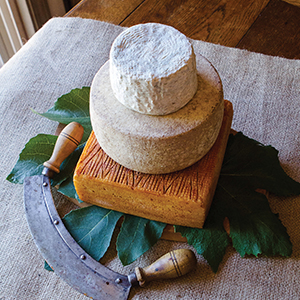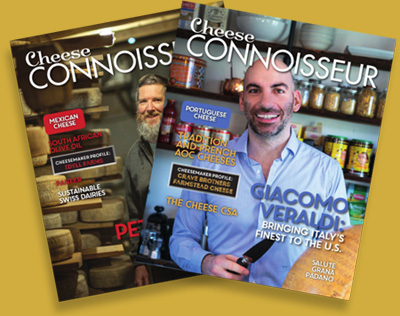Childhood memories of local cheeses made in the Savoie region of the French Alps were a strong pull for Carine Goldin of Goldin Artisan Cheese, headquartered in Molalla, OR. Her formative years spent there with her cheese-loving grandmother, nearby dairy farms and creameries making local favorites like Tomme de Savoie, Raclette and Tome des Bauges stoked a taste for interesting, full-flavored cheese.
“Cheese was an important part of life growing up,” says Goldin, a gentle and focused woman whose mid-life career shift brought her back to her roots. “My grandmother loved cheese and introduced me to many types with different sharpness. There, cheese is a staple, along with bread and pastries. It’s an integral part of our everyday meals.”
Growing up in a hamlet surrounded by farms, it was easy to find interesting, flavorful local cheeses. “There were creameries in the adjacent villages. I used to love to hang out and just watch them make the cheese and was fascinated by cows at a young age. I made the connection from the cow to the cheese.”

The fruits of that labor were readily available, and she recalls visiting her local cheese shop, which was “absolutely packed to the hilt, all shelves, counters, everywhere, with different styles of cheese, butters, creams, crème fraiche. The man behind the counter was super knowledgeable. For the 11-year-old me, it was fascinating.”
Had she stayed in France where great cheese is plentiful, she may never have taken up the vocation of cheesemaking. Instead, Goldin set her sights on school in America, attending the University of Colorado, marrying and then starting a family in New Mexico. Very far, indeed, from her alpine origins.
“It was the 80s, so it was all Velveeta and the rubbery, flavorless stuff,” she recalls of her early years in America. Goldin was in total cheese withdrawal, unable to stomach the varieties available to her. On a trip back to visit her grandmother, she had an epiphany. Smuggling cheese back in her suitcase was not a long-term solution. She’d have to make the cheese herself.

Goldin’s early efforts were unsuccessful, with a dearth of cheesemaking information, recipes for complex, rinded cheeses and the cultures needed to make them. The arid climate of New Mexico was also not for her.
A move to Portland, OR in 1996 brought her closer to the long-simmering dream. There, she was able to source goat milk for home cheesemaking experiments and read all she could about cheese.
In the early 2000s, she attended the very first “How to Become a Cheesemaker” course offered by Oregon State University and began to entertain the idea of a commercial venture. The artisanal cheese scene was just beginning to rise in Portland, and these classes proved fertile ground for what would follow.
“It took a good three or four years to not only educate myself a little more on cheesemaking, but also on the requirements of the Department of Ag and then designing my creamery on a limited budget,” she says.
As she researched and planned, Goldin was living in Portland and working in product chain management at Adidas and Columbia Sportswear. This urban environment was not conducive to launching her business.
In 2004, she moved to a 5-acre farm in Molalla, a rural community about 45 minutes south of Portland in the foothills of the Cascade mountains. Here, Goldin was able to make the leap to goat ownership and cheesemaking, building a small creamery on the property in 2007 and getting licensed in 2009.

At first, she bought goat milk locally but, she says, “When I looked at the land, I thought it had to be productive. When I got milk, I’d see the goats, and it was inevitable that I’d fall in love with them. You get two and, of course, it multiplies very fast.”
In both the dairy and the cheese operation, Goldin’s processes were deliberate and incremental. She began with 12 goats and slowly increased her herd size over time; currently, she milks about 45 goats.
“We are small, so it limits how many goats we can have,” she says. Her herd is filled with generations of Alpine, La Mancha and Alpine x La Mancha crosses. “I find that the crosses are more sturdy stock. Good genetics are important, but it also has to do with the pasture. We have a nice pasture here in the foothills of the Cascades, and the goats just love it.”
The goats are milked seasonally and on pasture as early and late as the Oregon weather permits. In the small but productive cheese room, Goldin creates an array of cheeses inspired by those of her youth.
“Early on,” she says, “many of the recipes I saw were very simple, used one culture, and I wasn’t getting the results. I like to experiment and change up recipes, so I developed a cocktail of cultures to get more flora on the cheese. That was the key to make cheese reminiscent of the types I grew up with.”
Her cheeses are rustic and beautiful, ranging from surface-ripened and washed semi-soft types to semi-firm Tomme styles made with raw milk. The culture cocktail is evident in the abundant growth on the mottled and well-developed rinds and the interesting, sophisticated yet delicate flavors she coaxes out of the cheeses.

Certoux means “cellar” in the patois dialect of the Savoie, and this surface-ripened cheese develops a nice bit of complex flavor during its month-long aging. Cascadian Frechette develops a delicate rind through repeated washing during a five-week aging process. Pur et Simple is Goldin’s take on the traditional bloomy-rind cheese. All three have been finalists at the Good Food Awards in the last few years.
One of her most distinctive and strikingly beautiful cheeses is the washed rind Chaumine, named for her childhood home, one of the few in the area with a thatched roof. Likewise, the cheese has a gorgeous, thatched look to the rind and the distinctive orange color that results from washing during affinage. It won Super Gold at the 2015 World Cheese Awards in Birmingham, England, and was a finalist at the 2016 Good Food Awards.
On the semi-firm side, a variety of Tommes have also represented well in the world. Aged a bit longer and made from raw milk, these cheeses are washed and matured in a variety of ways, including the balsamic washed Tomme des Vignes and Tomme de Sawtell, winner of the 2016 Good Food Award for cheese.
Goldin’s cheeses are garnering acclaim and a nice slice of market in restaurants and specialty shops in Seattle and Portland. Renowned Portland cheesemonger Steve Jones is quick to praise Goldin’s cheeses. “Texturally, they have that very interesting velvety texture that stands apart from other cheeses,” he says. “Flavor wise, they are earthy, rustic, yet balanced. You’ve almost got to go to France to get cheeses this rustic. Being seasonal and elusive just adds to their mystique,” he says.

Goldin remains small enough that a good portion of her sales come from devoted fans at nearby farmers markets in Portland and Lake Oswego.
And she feels particular kinship with her market customers. “I had one French lady tell me ‘if it doesn’t have mold on the outside, the cheese is not interesting to me.’ I knew immediately that she gets it,” she says.
For the uninitiated American palate, though, it was a stretch, particularly early on. “Usually on Tommes, you don’t eat the rind, but on the Bloomies, you have people questioning that rind because they just don’t know. It took a lot of education in the beginning, and I didn’t know if it was going to work.”
Thankfully, the local tastes have become more and more sophisticated and aware of fine cheese in the last decade or so, and Goldin’s products are well-established in the treasure trove of Northwest cheese. Though it’s a second-act career, Goldin shows no signs of slowing down and is devoted to bringing her craft and art to as many cheese-lovers as possible.



